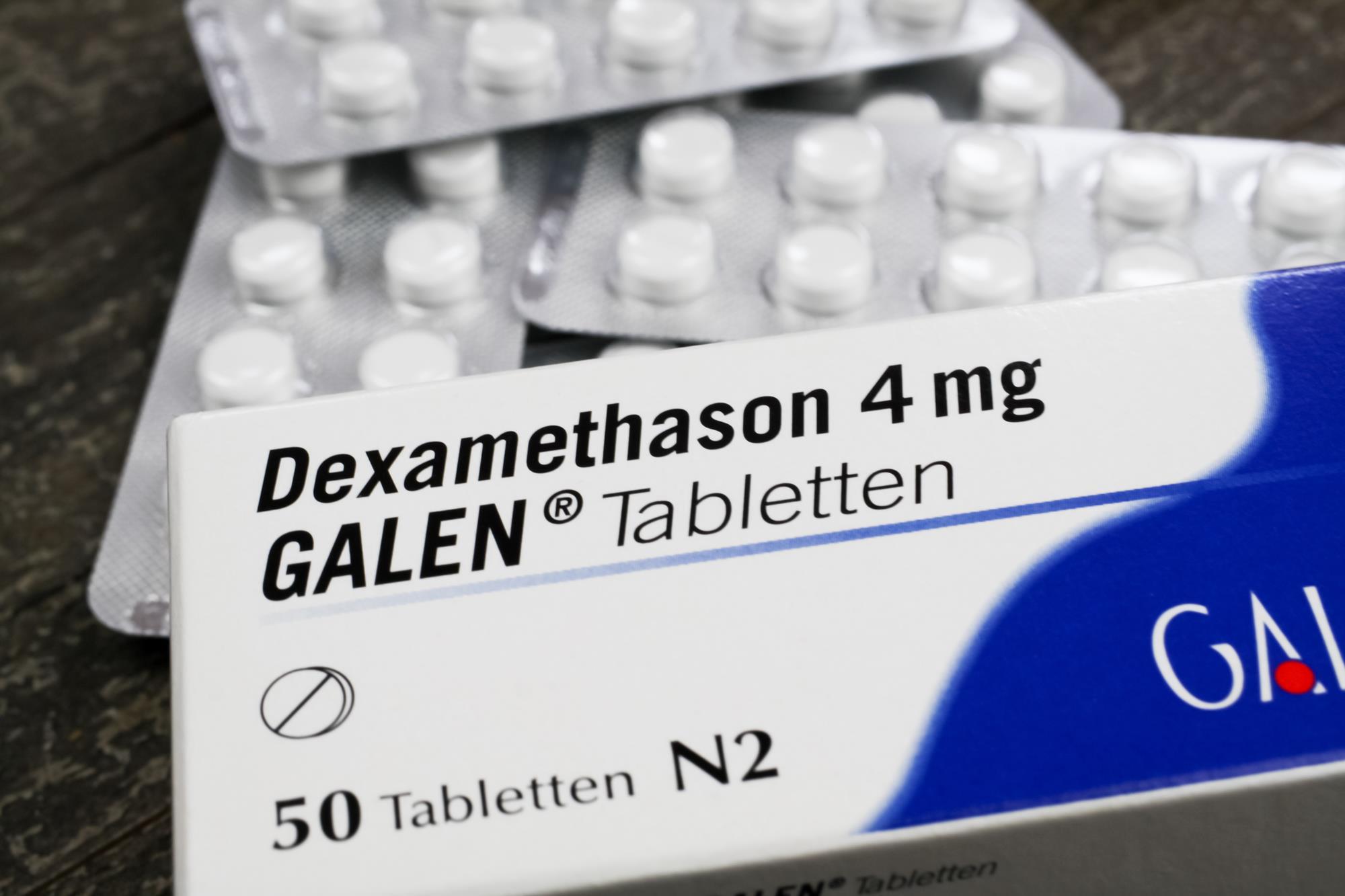Is Dexamethasone a miracle drug for treating many medical conditions? Let’s find out all the aspects of this powerful corticosteroid . It is used to treat inflammation and autoimmune diseases . But , it can also have side effects .
Let’s explore together the essential information about this multifaceted medicine .
What is dexamethasone?
Dexamethasone is a very powerful synthetic corticosteroid . It is based on cortisone, a hormone of the adrenal glands. It helps fight inflammation and reduce immune activity , making it useful against many diseases.
Overview of Dexamethasone
Dexamethasone has a molar mass of 392.461 g/mol. Its anti-inflammatory and immunosuppressive effect is 40 times stronger than that of cortisol. The WHO considers it essential and it is widely used in medicine, surgery, ophthalmology and plant biology.
Available forms and dosages
Dexamethasone comes in several forms and dosages :
- Tablets of 0.5 mg, 0.75 mg, 1 mg, 1.5 mg, 2 mg, 4 mg and 6 mg
- Oral solutions of 0.5 mg/5 mL and 0.5 mg/5 mL
- Eye and ear drops
Dosages and methods of administration vary depending on the diseases and needs of the patients. They range from 0.4 mg to 40 mg per day, orally , intravenously , intramuscularly or locally.
“Dexamethasone is one of the WHO’s essential medicines.”
Uses of Dexamethasone
Dexamethasone is a powerful anti-inflammatory drug . It is very useful in treating various diseases. It helps reduce symptoms of inflammation in the body, such as in the lungs, skin, joints, and intestines.
Treatment of inflammations
It is often given for asthma , allergies , rheumatoid arthritis , and other conditions. It also helps with eczema, psoriasis, Crohn’s disease , and ulcerative colitis . Additionally, it controls attacks of multiple sclerosis and myasthenia gravis .
Treatment of autoimmune diseases
Dexamethasone also helps with some autoimmune diseases . For example, lupus , pemphigoid , severe seborrheic dermatitis , and mycosis fungoides . It helps the immune system work better.
| Use of dexamethasone | Targeted pathologies |
|---|---|
| Treatment of inflammations | Asthma , allergies , rheumatoid arthritis, skin diseases , intestinal diseases , multiple sclerosis , myasthenia gravis |
| Treatment of autoimmune diseases | Lupus , pemphigoid , seborrheic dermatitis , mycosis fungoides |
“Dexamethasone is an essential medicine in the treatment of many inflammatory and autoimmune conditions, providing significant relief to patients.”
Dexamethasone and COVID-19
Research from the RECOVERY clinical trial showed that dexamethasone is useful against severe COVID-19 . This study from the University of Oxford proved that this drug reduces mortality in patients with respiratory distress.
The results of the RECOVERY clinical trial are very promising:
- Among patients on respiratory support, including mechanical ventilation, dexamethasone reduced mortality by 12%.
- In those who do not need respiratory support initially, dexamethasone reduces deaths by 4%.
- On average, dexamethasone reduces deaths from severe COVID-19 by 20% .
Thanks to these results, dexamethasone is now being used to treat some severe forms of COVID-19 . Its easy access and low cost make it attractive, especially in low- and middle-income countries.
“Corticosteroids, such as dexamethasone, are generally not associated with serious side effects , and monitoring is needed primarily to control temporary hyperglycemia.”
Although further research is needed, especially in specific groups, these data suggest that dexamethasone is crucial for treating severe COVID-19 .
Benefits of Dexamethasone
Dexamethasone is a common medication. It is known for its benefits in treating several diseases. It helps in particular in inflammatory and autoimmune conditions . It is also useful for some patients with severe forms of COVID-19 .
Dexamethasone helps reduce inflammation and modulate the immune system . It relieves symptoms of several diseases. It is used to treat asthma , allergies , rheumatoid arthritis , and some cancers .
For COVID-19 , dexamethasone reduces mortality in severe patients. It limits the damage caused by excessive inflammation.
| Indications | Benefits |
|---|---|
| Inflammatory and autoimmune conditions | Reduction of inflammation, modulation of the immune system |
| COVID-19 (severe forms) | Reduction of mortality, limitation of damage linked to inflammation |
| Asthma , allergies , rheumatoid arthritis, certain cancers | Relief of symptoms |
In conclusion, dexamethasone is a very useful drug. It is a valuable tool for doctors.
“Dexamethasone has proven to be a life-saving treatment for many patients with severe COVID-19 .”
Side effects of dexamethasone
Dexamethasone, a powerful anti-inflammatory drug , can cause side effects . Most are mild and short-lived. But it is important to report them to your doctor.
Common side effects
Common side effects of dexamethasone include :
- Fatigue and drowsiness
- Increased appetite and weight gain
- Acne or other skin problems
- Sleep disorders
Serious side effects
Some serious side effects of dexamethasone require special attention:
- Severe allergic reaction (rash, hives, swelling, difficulty breathing)
- Eye disorders (glaucoma, cataracts)
- High blood pressure
- Elevated blood sugar in diabetic patients
- Osteoporosis
- Gastrointestinal ulcers
If you have these serious side effects , tell your doctor right away. He or she may adjust your treatment.
| Common side effects | Serious side effects |
|---|---|
| Fatigue , drowsiness | Allergic reaction |
| Increased appetite, weight gain | Eye disorders |
| Acne , skin problems | High blood pressure |
| Sleep disorders | Increased blood sugar |
| Osteoporosis | |
| Gastrointestinal ulcers |
“It is important to monitor for these serious side effects and report them to your doctor promptly.”
In conclusion, dexamethasone is effective but requires caution. Side effects, especially serious ones, should be monitored. Regular consultation with your doctor is essential for your safety.
Dosage and administration
Dexamethasone is often taken by mouth . It is available as tablets or oral solutions . The dose varies depending on the patient and their health problem.
Il est conseillé de prendre la dexaméthasone avec les repas. Cela aide à éviter les problèmes d’estomac. Les adultes commencent généralement avec 0,05 mg/kg/jour à 0,2 mg/kg/jour. Les enfants reçoivent 0,075 mg/kg/jour à 0,3 mg/kg/jour.
Pour les maladies inflammatoires sévères, la dose peut monter jusqu’à 1,2 mg/kg/jour. Le traitement d’entretien se fait avec 0,5 mg/jour à 1,5 mg/jour de dexaméthasone.
Le traitement du COVID-19 demande 6 mg par jour par voie intraveineuse. Cela dure jusqu’à 10 jours pour les adultes. Les adolescents de 12 ans et plus reçoivent la même dose.
Il ne faut pas prendre la dexaméthasone avec des vaccins vivants. Cela pourrait interférer avec l’effet du vaccin. Lorsque le traitement s’arrête, il faut diminuer progressivement la dose. Cela aide à éviter les rechutes.
En conclusion, la posologie de la dexaméthasone varie selon le patient et son problème de santé. Elle est prise par voie orale, surtout pendant les repas, pour réduire les effets secondaires.
Précautions d’emploi
La dexaméthasone est un médicament très puissant. Il faut être très prudent lorsqu’on l’utilise. Il y a des interactions médicamenteuses et des contre-indications à connaître pour être sûr.
Interactions médicamenteuses
La dexaméthasone peut interagir avec plusieurs médicaments. Cela inclut les antibiotiques, les antifongiques, les anticoagulants, les statines et certains médicaments du diabète. Il est crucial de dire à votre médecin tous les médicaments que vous prenez. Cela aide à éviter les risques d’interactions.
Contre-indications
La dexaméthasone ne doit pas être prise dans certains cas. Cela inclut les infections fongiques, la tuberculose active et les antécédents de parasitose. Elle ne doit pas être combinée avec des vaccins à virus vivants car cela pourrait réduire leur efficacité.
Il est essentiel de suivre les conseils de votre médecin sur la prise de dexaméthasone. Cela aide à éviter les risques liés aux interactions et contre-indications.
“La dexaméthasone est un médicament puissant qui nécessite des précautions particulières lors de son utilisation.”
Surveillance médicale
Pendant le traitement à la dexaméthasone, il est crucial de suivre régulièrement les progrès. Cela aide à repérer tout effet secondaire. Voici ce qui est important :
- Regular blood tests to check for treatment-related side effects, such as changes in blood sugar levels or signs of high blood pressure.
- Periodic eye exams to check for eye problems such as cataracts or glaucoma, which can be side effects of dexamethasone.
- Close monitoring of blood glucose in diabetic patients, as dexamethasone may influence glycemic control.
Medical monitoring also helps to adjust the dose of dexamethasone if necessary. This allows you to get the most out of treatment while limiting the risks. It is essential to communicate openly with your doctor throughout treatment.
| Monitored parameter | Frequency | Objective |
|---|---|---|
| Blood test | Every 4 to 8 weeks | Detect any side effects related to treatment |
| Eye examination | Every 6 months | Detecting eye disorders |
| Blood sugar monitoring | Several times a day in diabetic patients | Adjust antidiabetic treatment if necessary |

By following these recommendations, patients can fully enjoy the benefits of treatment while reducing the risk of side effects.
Conclusion
Dexamethasone is a very powerful corticosteroid . It is crucial in the treatment of several inflammatory and autoimmune diseases. It also helps a lot in severe COVID-19 patients, lowering mortality in those who need oxygen.
However, caution is needed with dexamethasone. It can cause side effects. Doctors should therefore be very careful about precautions , interactions with other drugs and contraindications .
In summary, dexamethasone is a very important treatment. It helps in the treatment of inflammatory and autoimmune diseases, and also for patients with severe COVID-19. If used correctly, according to the advice of doctors, it can be very beneficial and low risk.



